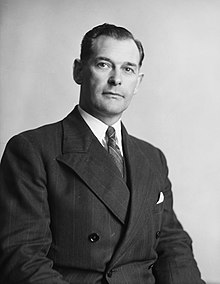Our website is made possible by displaying online advertisements to our visitors.
Please consider supporting us by disabling your ad blocker.
Keith Holyoake
Sir Keith Holyoake | |||||||||||||||||||||||||||||||||||
|---|---|---|---|---|---|---|---|---|---|---|---|---|---|---|---|---|---|---|---|---|---|---|---|---|---|---|---|---|---|---|---|---|---|---|---|
 Holyoake, c. 1950s | |||||||||||||||||||||||||||||||||||
| 13th Governor-General of New Zealand | |||||||||||||||||||||||||||||||||||
| In office 26 October 1977 – 25 October 1980 | |||||||||||||||||||||||||||||||||||
| Monarch | Elizabeth II | ||||||||||||||||||||||||||||||||||
| Prime Minister | Sir Robert Muldoon | ||||||||||||||||||||||||||||||||||
| Preceded by | Sir Denis Blundell | ||||||||||||||||||||||||||||||||||
| Succeeded by | Sir David Beattie | ||||||||||||||||||||||||||||||||||
| 26th Prime Minister of New Zealand | |||||||||||||||||||||||||||||||||||
| In office 12 December 1960 – 7 February 1972 | |||||||||||||||||||||||||||||||||||
| Monarch | Elizabeth II | ||||||||||||||||||||||||||||||||||
| Governors‑General | Charles Lyttelton Bernard Fergusson Arthur Porritt | ||||||||||||||||||||||||||||||||||
| Deputy | Jack Marshall | ||||||||||||||||||||||||||||||||||
| Preceded by | Walter Nash | ||||||||||||||||||||||||||||||||||
| Succeeded by | Jack Marshall | ||||||||||||||||||||||||||||||||||
| In office 20 September 1957 – 12 December 1957 | |||||||||||||||||||||||||||||||||||
| Monarch | Elizabeth II | ||||||||||||||||||||||||||||||||||
| Governor‑General | Charles Lyttelton | ||||||||||||||||||||||||||||||||||
| Deputy | Jack Marshall | ||||||||||||||||||||||||||||||||||
| Preceded by | Sidney Holland | ||||||||||||||||||||||||||||||||||
| Succeeded by | Walter Nash | ||||||||||||||||||||||||||||||||||
| 17th Leader of the Opposition | |||||||||||||||||||||||||||||||||||
| In office 12 December 1957 – 12 December 1960 | |||||||||||||||||||||||||||||||||||
| Prime Minister | Walter Nash | ||||||||||||||||||||||||||||||||||
| Deputy | Jack Marshall | ||||||||||||||||||||||||||||||||||
| Preceded by | Walter Nash | ||||||||||||||||||||||||||||||||||
| Succeeded by | Walter Nash | ||||||||||||||||||||||||||||||||||
| |||||||||||||||||||||||||||||||||||
| Member of the New Zealand Parliament for Pahiatua | |||||||||||||||||||||||||||||||||||
| In office 25 September 1943 – 10 March 1977 | |||||||||||||||||||||||||||||||||||
| Preceded by | Alfred Ransom | ||||||||||||||||||||||||||||||||||
| Succeeded by | John Falloon | ||||||||||||||||||||||||||||||||||
| Member of the New Zealand Parliament for Motueka | |||||||||||||||||||||||||||||||||||
| In office 1 December 1932 – 15 October 1938 | |||||||||||||||||||||||||||||||||||
| Preceded by | George Black | ||||||||||||||||||||||||||||||||||
| Succeeded by | Jerry Skinner | ||||||||||||||||||||||||||||||||||
| Personal details | |||||||||||||||||||||||||||||||||||
| Born | 11 February 1904 Mangamutu, New Zealand | ||||||||||||||||||||||||||||||||||
| Died | 8 December 1983 (aged 79) Wellington, New Zealand | ||||||||||||||||||||||||||||||||||
| Political party | Reform National (after 1936) | ||||||||||||||||||||||||||||||||||
| Spouse |
Norma Janet Ingram (m. 1934) | ||||||||||||||||||||||||||||||||||
| Children | 5 | ||||||||||||||||||||||||||||||||||
| Parent(s) | Henry Victor Holyoake Esther Eves | ||||||||||||||||||||||||||||||||||
| Relatives | Ken Comber (son-in-law) | ||||||||||||||||||||||||||||||||||
Sir Keith Jacka Holyoake, KG, GCMG, CH, QSO, PC (/ˈhoʊlioʊk/; 11 February 1904 – 8 December 1983) was a New Zealand politician who served as the 26th prime minister of New Zealand, serving for a brief period in 1957 and then from 1960 to 1972, and also as the 13th governor-general of New Zealand, serving from 1977 to 1980. He is the only New Zealand politician to have held both positions.[a]
Holyoake was born near Pahiatua in the Wairarapa. He left formal education at the age of 12 to help on the family farm. Before entering politics, he was active in various local farming associations. He was first elected to Parliament in 1932 for the Motueka electorate, representing the conservative Reform Party. Having played an instrumental role in the formation of the National Party in 1936, he lost his seat two years later. However, he was then earmarked for the safe seat of Pahiatua, which he held from 1943.
Following National's first election victory, Holyoake entered Cabinet in 1949. In 1954, he was appointed the first deputy prime minister of New Zealand, under Sidney Holland. Holyoake became leader of the National Party and prime minister two months before the 1957 election, after Holland's resignation due to ill health. Following an election defeat, he served as the leader of the Opposition for three years before National returned to power in 1960.
Holyoake's government rewrote the criminal legal code, passing the Crimes Act 1961. One of the main features of that act was the abolition of capital punishment, though only ten National MPs voted for its abolition. Among many conservative reforms, his government introduced a form of "voluntary unionism". In foreign policy, Holyoake supported the United States and sent troops to Vietnam. He led his party to four consecutive election victories (not since surpassed). In 1972, he resigned as prime minister to ease the succession for his deputy and friend, Jack Marshall.
In 1977, the National government of Robert Muldoon created controversy by appointing Holyoake as governor-general. Opponents argued that a former politician should not hold the non-partisan position. Holyoake's term was limited to three years, not the normal five. In 1980, he became a Knight Companion of the Order of the Garter, a rare honour.[1]
Holyoake is the third-longest-serving New Zealand prime minister (just under 12 years), surpassed only by Richard Seddon's 13 years and William Massey's close to 13 years. Holyoake was also the first to be born in the 20th century.[2] Known for his diplomatic style and "plummy" voice, he was also fondly (or mockingly) known as "Kiwi Keith", a name given to him in childhood to distinguish him from an Australian cousin with the same name.[2]
Cite error: There are <ref group=lower-alpha> tags or {{efn}} templates on this page, but the references will not show without a {{reflist|group=lower-alpha}} template or {{notelist}} template (see the help page).
- ^ "Keith Holyoake". nzhistory.govt.nz. Ministry for Culture and Heritage. Retrieved 5 September 2017.
- ^ a b Richard Wolfe (2005). Battlers, Bluffers and Bully-boys. Random House New Zealand.
Previous Page Next Page


